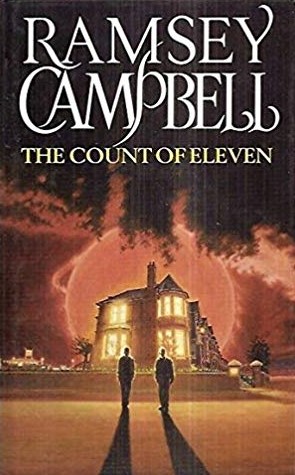 By RAMSEY CAMPBELL (Tor; 1992)
By RAMSEY CAMPBELL (Tor; 1992)
England’s Ramsey Campbell is one of the finest horror scribes on the scene, and THE COUNT OF ELEVEN one of his best-ever novels. Foreshadowing Donald Westlake’s 1997 stunner THE AX, it’s a relentless yet comedic peek into the mind of Jack Orchard, a sunny, always-joking family man turned serial killer.
All manner of bad luck befalls Jack’s family: the video store he runs burns down, his wife loses her job, and his daughter is attacked by three scummy boys named after the cast of THE GOOD, THE BAD AND THE UGLY(!). A firm believer in numerology, Jack puts everything in his life down to his lucky number eleven, including a chain letter he receives; since the numbers of the letter add up to eleven, he mails copies of it to thirteen unknown individuals. His luck, however, doesn’t improve, and so Jack deduces that not all of the recipients sent out copies of the letter as instructed. He decides to pay a visit to each, with a fire-spitting blowlamp in hand!
The people Jack meets all possess distinct personalities and occupations (and live in various far-flung locales, giving readers an atmospheric tour of the nether regions of the author’s native Liverpool), and those Jack kills with his blowlamp are all assholes in one way or another. I know the book has been criticized in some quarters for only doing away with bad characters, but that doesn’t make Jack’s murderous behavior any less unsettling.
Certainly this is a disquieting tale, but what gives it its edge is the humor Campbell injects into nearly every page (in place of the hallucinatory oppressiveness of Campbell classics like THE FACE THAT MUST DIE and THE HUNGRY MOON). The author was on a comedy kick at the time (as evinced by his novella NEEDING GHOSTS and the story he contributed to the BOOK OF THE DEAD anthology), and THE COUNT OF ELEVEN is surely the apotheosis of that trend. It’s genuinely funny, filled with ingeniously pulled-off slapstick set-pieces that in a strange way compliment rather than offset the nastiness. Witnessing the happy-go-lucky Jack becoming a ravening psychopath who calls himself The Count of Eleven is both hilarious and heartbreaking.
Equally unique is the construction of the narrative, which constantly keeps the reader on edge. This is true of the final scenes set on the shores of Greece, where, in a seeming turnaround of Jack’s bad luck, he and his family win a vacation. This sequence has a surprisingly languid flow, different from the rest of the book—Campbell deliberately avoids closing things out on a high note, a daring and unexpected choice that turns out to be exactly what this wild and crazy but also dark and melancholy book needs.
